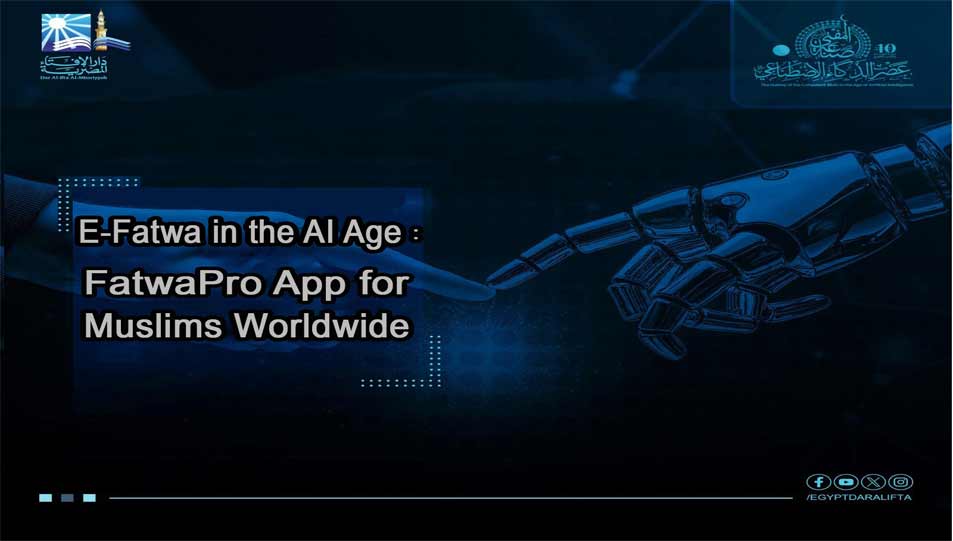E-Fatwa in the AI Age: Reimagining Islamic Guidance for Muslim Minorities

In an era defined by rapid digital innovation and the rise of artificial intelligence (AI), faith-based institutions are reevaluating their roles and responsibilities in a changing world. For Muslim minorities living in non-Muslim societies, the demand for accessible, trustworthy, and context-sensitive religious guidance has become more urgent than ever. Bridging the gap between classical Islamic scholarship and modern technology is no longer a luxury—it is an essential service rooted in responsibility and vision.
As Egypt’s Dar al-Ifta prepares for its 10th annual international conference under the auspices of the General Secretariat for Fatwa Authorities Worldwide, one of its most pioneering contributions to the field of e-fatwa stands out. This globally respected institution, renowned for its intellectual rigor and unwavering commitment to a balanced, moderate interpretation of Sunni Islam, has taken a bold step in merging tradition with innovation. In June 2022, Dar al-Ifta launched FatwaPro, a smart mobile application designed to respond to religious inquiries from Muslims around the world—particularly those living in Western societies. The initiative exemplifies how classical Islamic institutions can stay firmly rooted in their heritage while embracing modern technology to address the evolving needs of contemporary Muslim communities.
Traditionally, the process of seeking a fatwa (an Islamic legal opinion) involved direct, often personal interaction between the mufti and the questioner. The exchange was usually rooted in a shared local context. This method still holds particular importance in sensitive matters such as divorce investigations that require input from both spouses. However, in our increasingly globalized world, Muslim communities face diverse, complex issues that transcend national and cultural boundaries. Questions now span topics such as family law, gender identity, bioethics, financial transactions, religious doubt, and even the ethical implications of AI itself.
The digital transformation of fatwa services reflects a profound understanding of a fundamental principle in Islamic jurisprudence: that fatwa changes with the change of time, place, people, and circumstances. This maxim, confirmed by prominent jurists such as Imam al-Qarafi and Ibn al-Qayyim, illustrates that while the sources of Islamic law remain fixed, their application must consider the evolving realities of those seeking guidance. As the Qur'an reminds us, “We have not sent you [O Muhammad] except as a mercy to the worlds” (Qur'an 21:107), and this mercy is not only embodied in the message of Islam but also in its ability to adapt to the needs of diverse communities across time and space.
Through FatwaPro, Dar al-Ifta has not merely digitized religious rulings; it has brought this juristic principle to life in real time. It recognizes that a young Muslim woman in Paris, a convert in Toronto, or a medical professional in Singapore may each seek religious guidance that is nuanced and unique to their lived context.
Since its launch, FatwaPro has handled 6,740 fatwas, with 3,470 issued in 2024 alone. The platform now averages up to fifteen inquiries per day, predominantly in English and French. Most of the users come from the United States, Southeast Asia, the United Kingdom, and parts of the Arab Gulf region, especially countries like the UAE and Saudi Arabia, where many non-Arabic-speaking Muslims reside.
Notably, over sixty percent of recent inquiries have been related to family matters, including questions on marriage, divorce, parenting, and gender roles. These are not only deeply personal issues but also reflect the growing tensions that many Muslims experience as they try to reconcile religious teachings with modern social environments. The app’s ability to collect and analyze such recurring themes allows Dar al-Ifta to anticipate emerging needs and respond with deeper scholarly engagement and tailored content. This is not only a service—it is a reflection of the Prophetic model of guiding people with wisdom, mercy, and insight. As the Prophet (peace and blessings be upon him) advised, “Make things easy and do not make them difficult; give glad tidings and do not repel people” (Sahih al-Bukhari and Muslim).
Beyond answering individual questions, FatwaPro aspires to build a smarter and more compassionate fatwa culture. It seeks to foster trust, nurture spiritual confidence, and provide a supportive space for Muslims—particularly youth and new converts—who may be facing doubts, confusion, or isolation. It presents the mufti not merely as a legal authority, but as a companion and guide in the moral and spiritual journey of Muslims navigating new environments. By leveraging AI, data analysis, and digital media, Dar al-Ifta is revitalizing the role of the mufti in a way that resonates with the needs of the global Muslim community.
Egypt’s Dar al-Ifta has proven that when technology is aligned with tradition, and reason is guided by revelation, Islamic scholarship can thrive—not only in lecture halls and libraries but also in the hands of ordinary Muslims seeking answers, reassurance, and connection. FatwaPro is not simply an app—it is a gateway to a future where Islamic guidance is timely, intelligent, and filled with mercy.
______________
By Dr. Heba Salah
Researcher and Translator,
Dar al-Ifta, Egypt
 Arabic
Arabic French
French Deutsch
Deutsch Urdu
Urdu Pashto
Pashto Swahili
Swahili Hausa
Hausa
